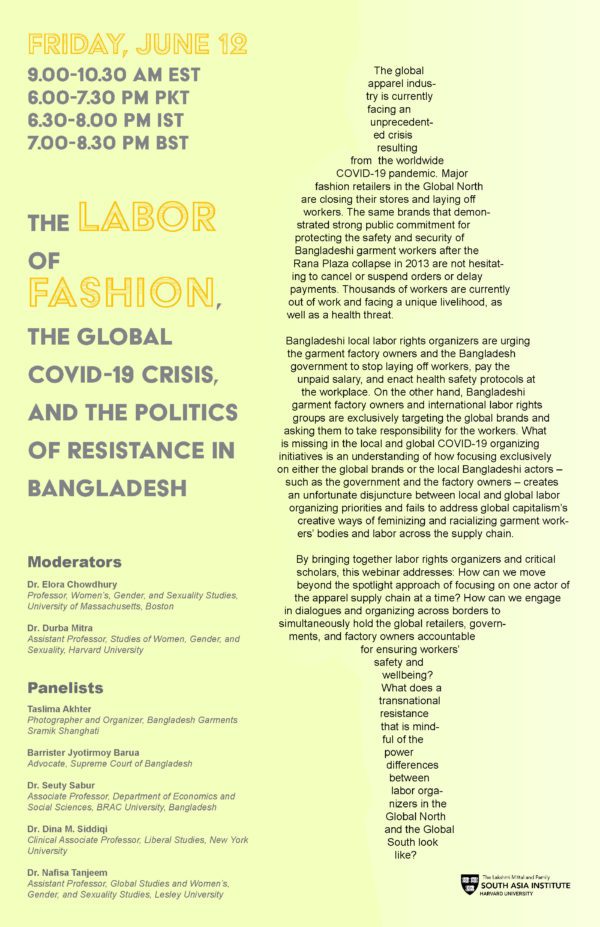NO REGISTRATION REQUIRED
9:00–10:30 AM EST // 6:00–7:30 PM PKT // 6:30–8:00 PM IST // 7:00–8:30 PM BST
Virtual via Zoom: https://harvard.zoom.us/j/99118872916
Stream via YouTube Live: https://youtu.be/JgegRQEm1UY
Moderators
- Dr. Elora Chowdhury, Professor, Women’s, Gender, and Sexuality Studies, University of Massachusetts, Boston
- Dr. Durba Mitra, Assistant Professor, Studies of Women, Gender, and Sexuality, Harvard University
Speakers
- Taslima Akhter, Photographer and Organizer, Bangladesh Garments Sramik Shanghati
- Barrister Jyotirmoy Barua, Advocate, Supreme Court of Bangladesh
- Dr. Seuty Sabur, Associate Professor, Department of Economics and Social Sciences, BRAC University, Bangladesh
- Dr. Dina M. Siddiqi, Clinical Associate Professor, Liberal Studies, New York University
- Dr. Nafisa Tanjeem, Assistant Professor, Global Studies and Women’s, Gender, and Sexuality Studies, Lesley University
The global apparel industry is currently facing an unprecedented crisis resulting from the worldwide COVID-19 pandemic. Major fashion retailers in the Global North are closing their stores and laying off workers. The same brands that demonstrated strong public commitment for protecting the safety and security of Bangladeshi garment workers after the Rana Plaza collapse in 2013 are not hesitating to cancel or suspend orders or delay payments. Thousands of workers are currently out of work and facing a unique livelihood, as well as a health threat.
Bangladeshi local labor rights organizers are urging the garment factory owners and the Bangladesh government to stop laying off workers, pay the unpaid salary, and enact health safety protocols at the workplace. On the other hand, Bangladeshi garment factory owners and international labor rights groups are exclusively targeting the global brands and asking them to take responsibility for the workers. What is missing in the local and global COVID-19 organizing initiatives is an understanding of how focusing exclusively on either the global brands or the local Bangladeshi actors – such as the government and the factory owners – creates an unfortunate disjuncture between local and global labor organizing priorities and fails to address global capitalism’s creative ways of feminizing and racializing garment workers’ bodies and labor across the supply chain.
By bringing together labor rights organizers and critical scholars, this webinar addresses: How can we move beyond the spotlight approach of focusing on one actor of the apparel supply chain at a time? How can we engage in dialogues and organizing across borders to simultaneously hold the global retailers, governments, and factory owners accountable for ensuring workers’ safety and wellbeing? What does a transnational resistance that is mindful of the power differences between labor organizers in the Global North and the Global South look like?

